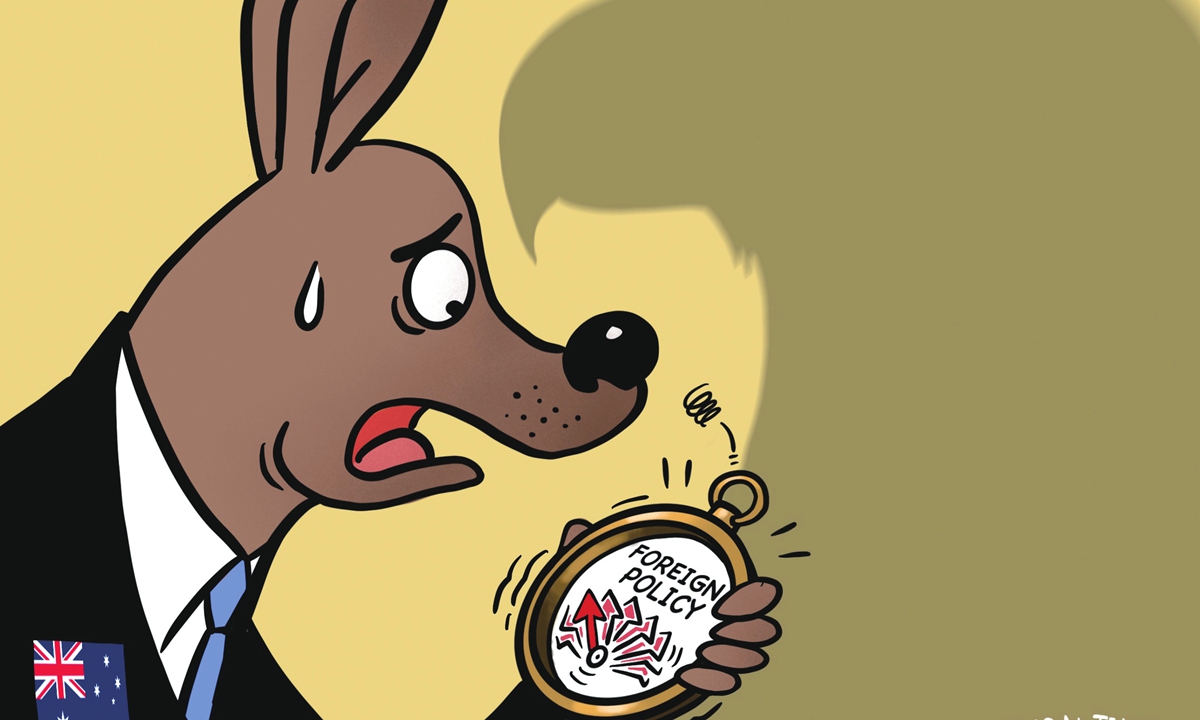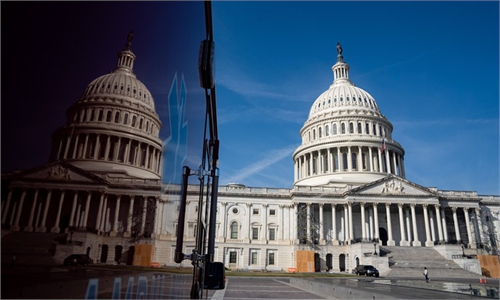
Illustration: Liu Rui/GT
Kim Beazley, former Australian defense minister, recently wrote an article for the Australian Strategic Policy Institute, a think tank reliant on US defense money that is keen to concoct and hype various anti-China topics, that the US is the critical "top cover" for the defense of Australia. He warned that "moving away from the US as uncertainties mount in our region accrue would be extraordinarily risky. If a gutted US does emerge, prepare for a defense outlay massively north of 2 percent of GDP."In April, with the release of Australia's Defence Strategic Review (DSR), discussions about Australia's increased defense spending and strengthening of the Australia-US alliance have become the focus. Behind these discussions is a significant issue that the Australian government's decision-making departments and strategic circles have been contemplating for a long time, which is how to choose between strategic autonomy and strategic dependence.
Since the Morrison government, Australia has continuously valued its alliance relationships and deepened its strategic dependence on the US. The dominance of alliance interests over national interests is challenging Australia's foreign policy, and strategic autonomy is becoming more and more of an empty phrase.
The Australia-US alliance is often seen as an important guarantee for Australia's national security, and strategic dependence on the US has become a matter of course. To maintain the alliance, Australia has participated in many US-led wars since World War II. Australia has paid a heavy price in these wars. However, Australia's self-sacrificing actions have not received corresponding returns.
In the new century, whether it is the Obama administration's interference in Australia's diplomacy, or the Trump administration's weakening of security commitments to allies, the Australia-US alliance is more like a wishful legend for Australia.
Unlike the losses and disappointments that alliance relationships often bring, pursuing strategic autonomy has brought enormous economic benefits and increased international status to Australia. Over the past half a century, Australia has made remarkable achievements in promoting multilateralism. The Asia-Pacific Economic Cooperation, with Australia as a founding member, remains an important multilateral mechanism with significant influence, playing a positive role in Australia's integration into Asia and strengthening its relations with Asia-Pacific countries. In terms of relations with China, the positive development of China-Australia relations had injected vitality into bilateral trade and Australia's economic growth.
The experience and lessons of the past half century have shown that only by increasing its strategic autonomy can Australia gain economic benefits and raise international status. On the contrary, the Australia-US alliance is more like a castle in the air and has not brought substantial help to Canberra. Under the Morrison administration, Australia's dependence on the US deepened. And the alliance became a shackle that limited Canberra's foreign policy space and forced the country to bear negative economic consequences. Taking sides between China and the US has damaged Australia's national interests greatly.
After the establishment of AUKUS, Australia abandoned the use of French conventional-powered submarines and turned to US and British technology to develop nuclear-powered submarines. It proposed a series of cooperation plans with the US on weaponry, attaching great importance to "interoperability" with the US in the field of weapon development and deployment. The DSR shows that Canberra continues the Morrison administration's pessimistic judgment regarding the regional situation, namely that Australia must be prepared for possible regional conflict due to China-US competition and, thus, needs to increase defense spending and military cooperation with the US as a response. However, increased "interoperability" inevitably increases Australia's military dependence on the US, making Canberra more likely to be tied to the US chariot. This is clearly not in Australia's national interest.
At present, China-Australia relations have witnessed a thaw. Australia should carefully consider the impact of Chinese and US factors on Australia's national interests and clarify the difference between alliance interests and national interests.
As Australian strategic thinker Hugh White has pointed out, AUKUS commits Australia to fight China if the US does. Judging from the history of the US' treatment of allies, Washington keeps letting its hegemonic interests override the national interests of its allies. The deeper the allies' dependence on the US, the more they will be hijacked by US hegemonic practices. As a result, they will lose their initiative in diplomacy and strategy and face undermining of their national interests.
For decades, Australia has maintained a delicate balance between choosing strategic autonomy and dependence to safeguard national interests to the greatest extent possible. It will be a great challenge for the Albanese administration to become more proactive in creating a strategic environment and formulating foreign policy amid the increasingly serious China-US competition. But blurring the distinction between national and alliance interests will only place Australia's foreign policy in a more passive position.
The author is a research fellow at the Center for Australia, New Zealand and South Pacific Studies, Chinese Academy of Social Sciences. opinion@globaltimes.com.cn

